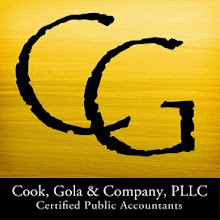As a CPA in public practice, part of my job is to help clients with their taxes. While bookkeeping services and tax preparation services also offer this service, what sets the CPA apart is the ability to do tax planning with clients. What is 'tax planning'?
There are two goals in tax planning. The first goal is to minimize our client's annual tax liability. The second goal is to make sure that the client has paid in just enough tax to cover that liability.
The first goal is probably the more important - and complex - of the two. In order to help a client minimize their tax liability, we must have an accurate accounting of their income and expenses. Then we have to be able to project that over a full year and estimate their total income. Then the real work begins. The key to minimizing tax liability is in finding out what the client needs and deciding how to meet those needs in the most tax-friendly manner possible. There are several common ways I am able to help clients with their tax liability, including salary management, retirement planning, asset acquisitions, or debt structuring.
The second part of tax planning involves making sure clients have the right amount of taxes paid in. This is easy for employees, because they can manipulate their withholding simply by turning in a new W-4 to the payroll department at their job. However, for self employed individuals and people with large amounts of investment income it's a much more complicated process.
We often ask our clients "what is the perfect tax return?" Most people would say that it's the one that gives them the most money back. In my opinion, though, the perfect tax return is one where there is a small refund generated. Consider this logic: refunds are generated by overpaying taxes during the course of the year. If a return shows a large refund, it means the taxpayer essentially gave the government an interest-free loan for the course of the year. Wouldn't that money be better off staying in their pocket in the first place? We think so.
The common thread is that all of this planning has to be done proactively, not reactively. In other words, April 14, 2010 is too late to do tax planning for 2009. In fact, January 1, 2010 is too late to plan for 2009. Now is a perfect time to be doing tax planning for 2009. Enough of the year has passed that people have a good idea of where they stand, and there is still enough time left in the year to carry out any plans that are developed. Don't put it off!
For more information on options for tax planning for yourself or your business, contact our offices.
--Dan Musick is the Tax Services Partner with Cook & Associates, a full service accounting firm with offices in San Marcos and San Antonio, TX
Accounting Will See Agentic AI
10 hours ago



No comments:
Post a Comment